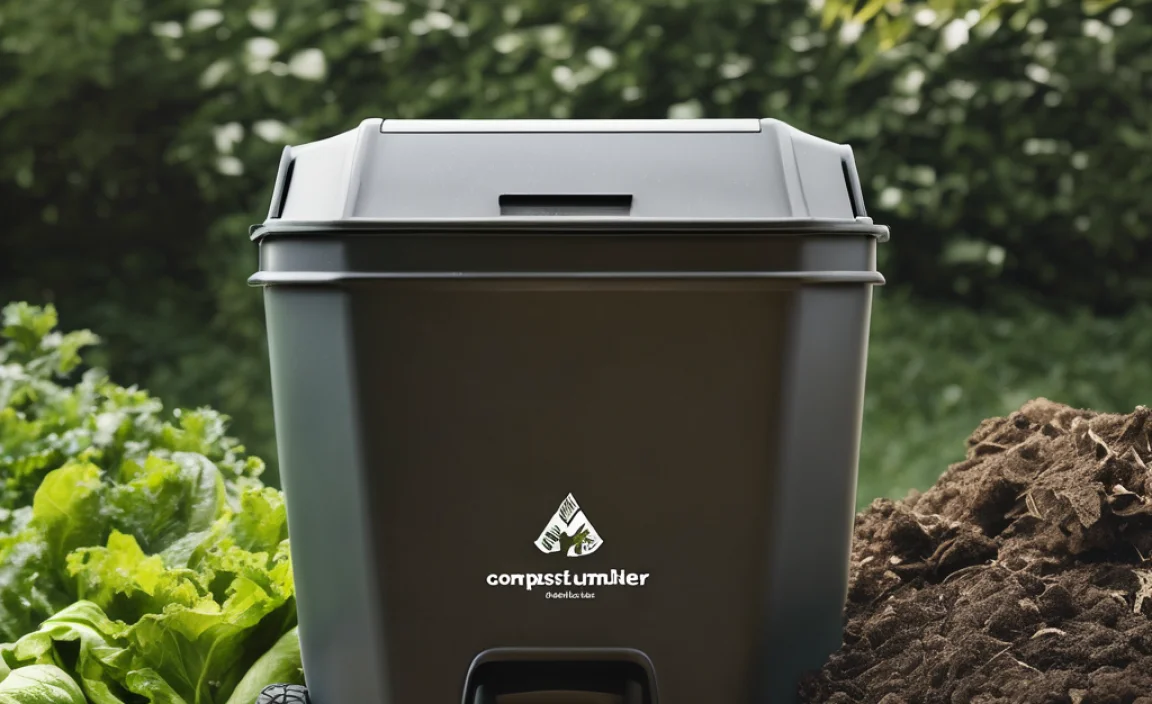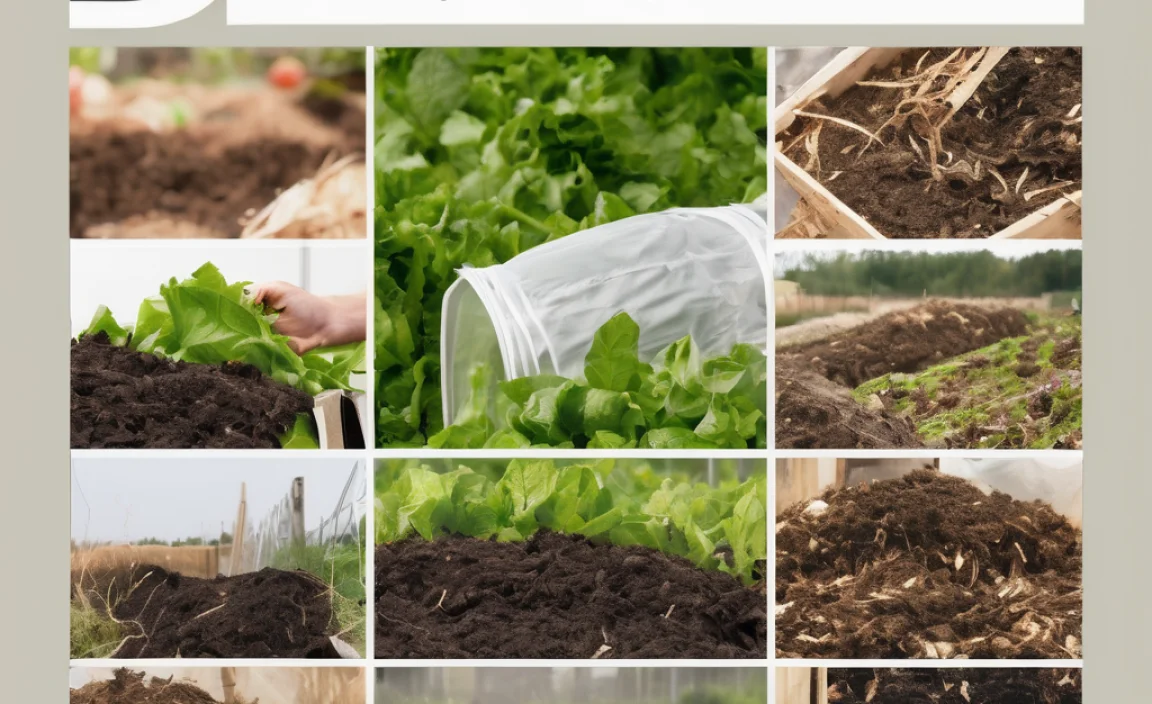Have you ever thought about turning kitchen scraps into rich soil? That’s what composting is all about! But did you know that sometimes things can go wrong? Home composting mistakes can happen to anyone. Let’s explore some interesting facts about composting and how to avoid these common errors.
Key Takeaways
- Avoid adding meat and dairy to compost piles.
- Proper balance of green and brown materials is vital.
- Turning the pile helps prevent home composting mistakes.
- Moisture levels affect composting success and speed.
- No plastics or metals should enter the compost pile.
Avoiding Common Composting Mistakes
Many people start composting with great enthusiasm. However, home composting mistakes can sneak up on anyone. One of the biggest mistakes is misjudging what goes into the compost bin. It’s important to only add organic material. Avoid putting in meat, dairy, or oils as they can attract pests. Instead, focus on fruit peels, vegetable scraps, and yard waste. Balance is key. You need a mix of green and brown materials. Green materials include grass clippings and vegetable scraps. Brown materials are leaves and twigs. Maintaining this balance speeds up the composting process.
- Never add meat or dairy to your compost.
- Stick to fruits, veggies, and yard waste.
- Mix equal parts green and brown materials.
- Keep the pile moist but not too wet.
- Avoid cooked food scraps.
- Turn the pile regularly.
- Check for non-compostable items.
Turning the pile helps oxygen flow, which is vital for composting. If the pile is too dry, add water. If it’s soggy, add more brown materials. Keep a close eye on the pile to avoid home composting mistakes. Composting is easy once you get the hang of it. Remember these tips, and your compost pile will thrive.
Fun Fact or Stats : Composting can reduce household waste by 30%!
Why Balance Matters
Have you ever tried to bake a cake without the right ingredients? Composting is a bit like that. Without the right balance of green and brown materials, it won’t work well. Green materials provide nitrogen, while brown materials give carbon. If you add too much green, the pile might smell. Too much brown, and it might not decompose. So, how do you get it right? Start with a small amount of each. Mix them well and add more as needed. It’s like building a perfect sandwich with just the right ingredients.
Turning the Pile
Would you like to know a secret to faster composting? It’s turning the pile! Just like flipping pancakes for even cooking, turning your compost helps it decompose evenly. The pile needs air, just like we do. Turning it lets oxygen in and heats it up. Warm compost means faster breakdown. Try to turn the pile every week. Use a garden fork if it helps. It’s a simple trick that can make a big difference! Plus, it gives you a chance to check for any home composting mistakes.
Moisture Control
How does a plant grow without water? It doesn’t. And neither does compost. Moisture is crucial for composting. But, too much water can drown your pile. Imagine mixing a perfect chocolate milkshake. You need just the right amount of milk. Composting works the same way. Keep it as moist as a wrung-out sponge. If rainwater makes it too wet, add dry browns. If it’s too dry, sprinkle some water. Keep a lid on it during heavy rainfall. Monitoring moisture prevents many home composting mistakes.
Materials to Avoid in Compost
Not everything belongs in your compost bin. Adding the wrong materials is a common home composting mistake. Plastics, metals, and glass will never break down. They only create clutter in the pile. Avoid cooked foods, as they can invite unwelcome guests. Always steer clear of synthetic materials. These can release harmful substances into the soil. That’s not what we want in a compost pile! Focus on garden waste, fruit, and veggie scraps. These break down quickly and enrich the soil.
- Avoid plastics, metals, and glass.
- Do not add cooked foods.
- Keep synthetic materials out.
- Stick to plant-based scraps.
- Check for unwanted visitors.
- Simplify with basic materials.
- Monitor for contamination.
Knowing what not to compost is as important as knowing what to add. A clean, well-managed compost pile will thrive. Avoiding these mistakes simplifies the process. Composting can reduce waste and enrich soil for your garden. Protecting the environment starts right at home.
Fun Fact or Stats : Composting helps reduce landfill waste by 28 billion pounds annually!
Plastics and Metals
Can you imagine a plastic sandwich? It sounds silly, right? Just like a sandwich, a compost pile needs the right ingredients. Plastics and metals don’t break down in compost. They can sit there for decades. This is why it’s crucial to keep them out. Use only biodegradable materials. Think of your compost like a living creature. Feed it the right stuff, and it will thrive. If you accidentally add some, try to remove it when turning the pile.
Cooked Foods
Why not feed your compost some cooked pasta? It seems harmless, but it’s not ideal. Cooked foods can attract pests. They might also slow down the composting process. Imagine a party where everyone brings their favorite snack. If someone brings stinky cheese, it could ruin everything. The same goes for compost. Stick to raw plant-based scraps. If you do add cooked foods, bury them deep. Or, rinse them to remove oils first. This keeps your compost balanced and pest-free.
Synthetic Materials
Why avoid synthetic materials in compost? Well, they don’t break down naturally. Imagine planting a garden in a pile of clothes! It sounds strange, right? That’s because synthetic materials don’t belong in compost. They can leach harmful chemicals into the pile. This could damage your garden. Stick to natural materials. Use leaves, twigs, and vegetable scraps. Avoid synthetic fabrics, like nylon or polyester. Keeping your compost natural ensures it’s safe for plants.
Maintaining the Right Temperature
Temperature plays a big role in composting. A compost pile should feel warm, like a cozy blanket. Steady heat helps break down materials. This is called the “hot composting” method. If it gets too cold, the pile slows down. It’s like a sleepy bear in winter! Checking temperature is important to avoid home composting mistakes. If it cools down, add more greens. This will heat things up again. A thermometer can help monitor the pile. Keeping it warm means faster composting.
- Check temperature regularly.
- Keep the pile warm, not hot.
- Add greens if it cools down.
- Use a thermometer for accuracy.
- Watch for slow decomposition.
- Avoid overheating the pile.
- Balance helps maintain heat.
Maintaining the right temperature ensures success. It speeds up the process and kills harmful germs. If the pile is too hot, it might smell or dry out. Keep adjusting as needed. A well-managed pile works like magic. It turns scraps into soil quickly. Stay attentive, and your compost will reward you.
Fun Fact or Stats : Compost piles can reach up to 160°F in temperature!
Why Heat Matters
Ever heard of a compost pile that cooks? It sounds strange, but it’s true! Heat speeds up decomposition. Just like cooking a meal, heat helps break down materials faster. Without enough heat, composting slows down. This is why it’s important to monitor temperature. Too much heat can dry out the pile. Keep it balanced. Adjust the mix of greens and browns as needed. It’s like adjusting spices in a recipe for the perfect flavor.
Using a Thermometer
Do you have a thermometer in your kitchen? It can be handy for composting too! A compost thermometer checks the temperature inside the pile. It helps track whether the pile is too hot or too cold. Insert the thermometer deep into the pile. Check it regularly, like a doctor taking your temperature. This helps keep the compost healthy. If the pile gets too cold, add more green materials. If it’s too hot, turn the pile to cool it down a bit. Monitoring helps avoid home composting mistakes.
Adjusting the Pile
How do you fix a compost pile that isn’t working? Adjust it! Like a car needing a tune-up, compost piles sometimes need fixing. If the pile is too wet, add dry browns. If it’s too dry, add water. If it smells, adjust the balance of materials. It’s all about experimenting. Each pile is unique. Monitor and adjust as needed. This keeps the composting process smooth and efficient. Think of it like tuning a musical instrument for the best sound.
Conclusion
Composting is a fun and rewarding activity. By avoiding home composting mistakes, you can create rich soil. Remember to keep a balance of green and brown materials. Monitor moisture and temperature closely. Use only natural materials in your compost pile. With practice, your compost will thrive and benefit your garden.
FAQs
Question: Can I compost meat and dairy?
Answer: No, it’s a common home composting mistake. Meat and dairy can attract pests. They also slow down decomposition. Stick to vegetable scraps and garden waste for best results. This keeps pests away and speeds up composting.
Question: How often should I turn my compost pile?
Answer: Turn your pile every week. Turning helps air flow and speeds up decomposition. It also allows you to check for any home composting mistakes. Regular turning keeps the pile healthy and active.
Question: Why is my compost pile not breaking down?
Answer: Your pile might lack balance or moisture. Check the mix of green and brown materials. Also, ensure the pile is moist but not too wet. Adjust these factors, and your pile should start breaking down.
Question: What do I do if my compost smells?
Answer: A smelly compost pile often means too much green material. Mix in more browns, like leaves and twigs. Also, turn the pile to improve airflow. This usually fixes the smell quickly.
Question: Can I put paper in my compost?
Answer: Yes, but only plain, non-glossy paper. Paper adds carbon, which helps balance the pile. Shred it first for faster breakdown. Avoid glossy or colored paper as it may contain harmful inks.
Question: Is composting good for the environment?
Answer: Yes, composting reduces waste and enriches the soil. It can cut down landfill waste and improve soil health. By doing so, it supports a healthier planet and encourages more sustainable gardening practices.


